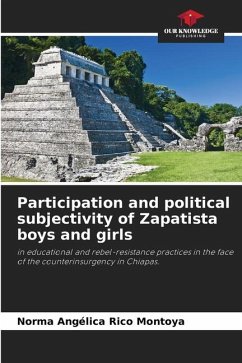The liberation of the rebel peoples as a horizon and the Zapatista education and formation as a pedagogy of resistance and emancipation have functioned for the Zapatista indigenous movement as formative strategies of historical and political subjects that strengthen the identity elements and bonds of belonging and identification between the rebel families and their children. Thus, the idea of solidarity, companionship, protective networks, care for the other and the relationship with "Mother Earth" appear as a constitutive part of political pedagogical practices and rebellious resistance in the face of nonconformity, injustice and experiences of violence. Zapatista education and training thus becomes a decolonizing tool of being, knowledge and power, but also a creative process of other ways of living, thinking, feeling and doing politics.
Bitte wählen Sie Ihr Anliegen aus.
Rechnungen
Retourenschein anfordern
Bestellstatus
Storno








